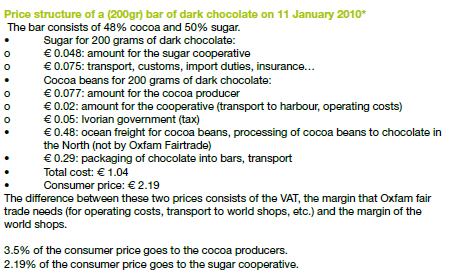At the ISM trade show, Fortin Bley, president of the Fairtrade Africa Cocoa Network and secretary general of the CANN co-op in the Ivory Coast stood out from the white-collar suits in his traditional African dress.
He explained how farmers in his cooperative had potentially increased their lifespan through Fairtrade training, which discouraged them from carrying drinking water in finished chemical containers.
“We learned this through Fairtrade. It is not because we are ignorant but Fairtrade enabled us to understand that this is important,” said Bley. “If I live, I can produce cocoa. If I die, I will produce no more cocoa. You will not have any more.”
The average life expectancy for a cocoa farmer in West Africa is 51 and many live below the poverty line on just $2 a day, according to Fairtrade International.
‘Each one of them takes a little’
Sustainable supply chain adviser Solidaridad says that many young people are turning their backs on cocoa in favor of other crops such as rubber or a move to big cities.
“The costs are huge. We do not earn enough,” said Bley. “I honestly think that the industrial producers make enough profit compared to the cocoa producers.”
“Everyone involved in the cocoa system; the exporter, the manufacturer, each one of them takes a little and then once you get to the producer he has just a small amount.”

Less than 5% of the price of a chocolate bar goes back to cocoa farmers, according to Oxfam.
“But do not forget also that the states, the governments, also profit from the cocoa producers,” said Bley. The Ivorian government cocoa tax, which is revised every six months, is around 20%.
“The government gets richer. But the producer, one could say that he fights for himself,” Bley continued.
The chocolate companies and farmers
The farmer said that most cocoa producers had little contact with the chocolate industry despite industry rhetoric to be closer to farmers. “We do not have a real relationship with the chocolate makers. Our traceability stops with the exporter.”
“How many producers eat chocolate? It is a luxury to eat chocolate! So he does not know what happens behind but he knows that there is a finished product which is called chocolate which he sees in shops. That is all, it stops there.”
Fixed cocoa premium empowers producers
According to Bley, Fairtrade’s guaranteed premium galvanizes cocoa farmers to invest in productivity and their communities.
Though just 1.2% of cocoa globally is sold on Fairtrade terms, major chocolate makers such as Mars, Ferrero and Hershey have committed to sourcing all cocoa from sustainable, certifiable sources by 2020.
This leaves manufacturers with a choice on which terms to buy their cocoa – on Fairtrade terms, which guarantees farmers a premium, or on UTZ Certified or Rainforest Alliance terms that set no fixed minimum.
UTZ Certified has previously argued that guaranteeing cocoa farmers a premium distorts the market by discouraging them from adopting good agricultural practices as they are guaranteed a reward regardless of quality. It favors teaching farmers business skills to negotiate themselves.
Premiums
Fairtrade guarantees a $2,000 per MT minimum price and a $200 premium for farmers, while similar organizations such as UTZ Certified instead teaches farmers business skills to negotiate a fair price. The average UTZ cocoa premium was €112 per MT in 2012.
Stronger cooperatives
Bley said that the guaranteed premium put humans at the center and ensured farmers greater earnings that could be invested in productivity.
“If the cooperatives are strong they can negotiate with industrial partners. If they are not strong, they are worthless. If we have premiums we can change the producer’s living conditions. We can transform producer’s living conditions,” he said.
According to Bley, Fairtrade premiums had encouraged more members to join his cooperative, which had consequently led to improved volumes.
The chocolate industry has a vested interest to grow volumes from key producing nations such as the Ivory Coast and Ghana amid damning predictions of a 1 million metric ton (MT) cocoa deficit forecast for 2020. The average monthly cocoa price has already risen 24% in January compared to last year to $2,819 per MT on supply concerns, according to the International Cocoa Organization (ICCO).
Child labor: Poverty and schools
Almost 820,000 children in the Ivory Coast and over 997,000 kids in Ghana were found to be working on cocoa-related activities in 2007/2008, according to Tulane University. Bley said that child labor had its roots in poverty.
“The other thing is that there is no school. From the moment when the child has a school, or there is a school in the village, the child realizes that he should not be working in the fields. From the moment when the adult is educated then the child is also educated. And that is important with the premium.”
